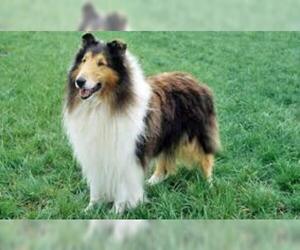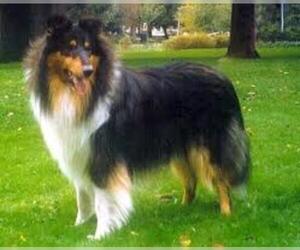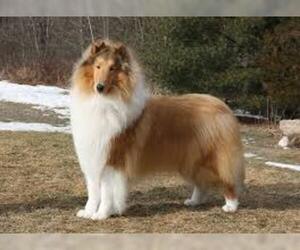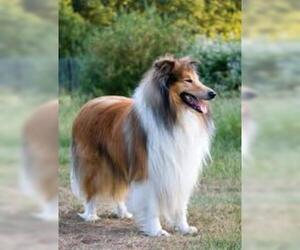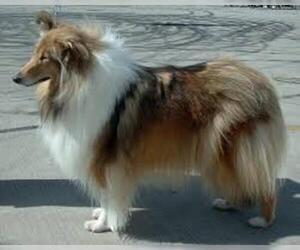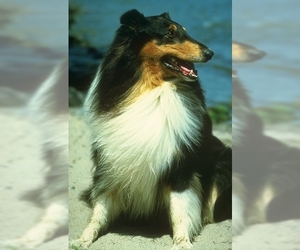
All about Collie dog breed
A.K.A. :Rough Collie, Smooth Collie, Scotch Collie, Scottish Sheepdog, Highland Collie, Long-Haired Collie, Short-Haired Collie, Lassie Dog, RC, SC, Collie Pup, Collie Companion, Borderless Collie, Gentle Herder, Velvet Collie
Size
Grooming requirements
Exercise requirements
Good with other dogs
Watchdog ability
Energetic
Training requirements
Playful
Affectionate
Good with other pets
Good with children
Good with strangers
Winter
Summer
Healthiness
Protective
Life Span
| Pure Breeds | Member |
| Breeds A - Z | C |
| Breeds by Group | Herding |
| Breeds by Trait | Good With Kids High Stamina Dog Breeds Smartest Dog Breeds |
| Overview: | The Collie, a majestic and intelligent breed, originates from Scotland where they were primarily used for herding sheep. Known for their striking beauty, Collies typically possess a long, flowing double coat that comes in a variety of colors including sable and white, tricolor, and blue merle. They have a graceful, athletic build, with a distinctive long muzzle and expressive eyes. In terms of temperament, Collies are renowned for being incredibly loyal, gentle, and highly trainable, making them excellent companions. Their affectionate nature makes them particularly well-suited for families with children, though their need for moderate exercise means they thrive in homes with yards, rather than cramped apartment living. While generally a healthy breed, potential owners should be aware of a predisposition to certain conditions like Collie Eye Anomaly (CEA) and drug sensitivities. With proper care and training, a Collie will enrich any household with their devoted companionship and bright personality. |
F.A.Q.
All You Need to Know About the Collie Breed
The Collie, famously originating from Scotland as a herding dog, is renowned for its gentle and intelligent temperament. These medium-to-large-sized dogs boast a striking appearance, typically with a long, flowing coat (Rough Collie) or a shorter, dense coat (Smooth Collie), and expressive eyes. Collies are exceptionally loyal and affectionate family dogs, thriving on companionship and interaction, making them excellent with children and other pets. While adaptable, their size and need for mental stimulation mean they are not ideally suited for small apartment living unless given ample outdoor access and activity. They require moderate daily exercise to stay healthy and happy, coupled with regular grooming (especially the Rough Collie) to maintain their beautiful coats and prevent matting. Common health considerations include MDR1 gene mutation and Canine Hip Dysplasia. Choosing a Collie means welcoming a devoted, trainable, and loving companion into your home.Collie Weight: Average Size & Healthy Weight for CollieThe average weight of an adult Collie is between 50 and 75 pounds.* Males: Typically weigh 60-75 pounds.* Females: Generally weigh 50-65 pounds.Maintaining a healthy weight for Collie is crucial for their well-being.
Wondering, "how tall is a Collie?" and what is the average size you can expect? Here's a clear breakdown of typical Collie height:
The average height of a Collie ranges from 22 to 26 inches (measured at the shoulder) for an adult dog. This makes them a medium-to-large breed, with a statuesque and elegant appearance.- Males: Typically stand between 24 to 26 inches tall.
- Females: Generally a little shorter, ranging from 22 to 24 inches tall.
Collie Colors FAQ: Exploring Coat Types & VariationsCollies showcase a stunning array of coat colors, though not all are officially recognized by major kennel clubs like the AKC. Understanding these "Collie colors" is key for potential adopters or buyers comparing Collie coat types and pricing.The most widely AKC recognized Collie colors include:* Sable and White: This classic combination features a rich fawn or mahogany base with white markings on the collar, chest, legs, and tail tip. This can range from light gold to deep red.* Tri-color: A striking black body with tan markings on the face, legs, and under the tail, always with white markings.* Blue Merle: A captivating marbled pattern of silver-grey and black, often with tan points and always with white markings. The merle gene can affect eye color, leading to blue eyes or heterochromia (different colored eyes).* Sable Merle: Similar to sable and white, but with merle patterning (marbling) in the sable areas, often resulting in lighter, more mottled shades of fawn/sable with white.* White: Predominantly white, with color (sable, tri-color, or blue merle) markings on the head and sometimes a patch or two on the body. This is distinct from "double merle" whites, which can have health issues.Beyond these officially recognized shades, you may encounter rare Collie colors and exotic Collie variations, though these are generally not accepted for show by the AKC and other major kennel clubs. These can include:* Brindle: While sometimes seen, pure brindle (stripes of darker color on a lighter base) is generally not accepted.* Mahogany: A very deep, rich red sable.* Cream: A very pale sable, almost white, with minimal dark pigment.* Chocolate/Liver: This very rare Collie coat type is characterized by a brown nose and paw pads, and a reddish-brown coat. It is not an accepted color.* Dilutes (e.g., Lilac/Isabella): Extremely rare and generally indicative of a dilute gene that can affect coat and eye pigment, leading to faded colors. Not accepted.When considering "Collie colors," remember that while all coat types are beautiful, AKC recognized Collie colors adhere to specific breed standards. Pricing may vary based on rarity and demand for particular Collie coat types. Always verify a breeder's claims and health clearances, especially when inquiring about rare coat types or exotic Collie variations.
The Collie personality is renowned for its gentle, intelligent, and devoted nature. This breed is exceptionally friendly, forming strong bonds with its family and displaying immense loyalty. Collies are highly sociable and thrive on interaction, making them wonderful companions. While they appreciate space to run, their adaptable nature means they can be comfortable in an apartment, provided they receive adequate exercise and mental stimulation. They are typically very good with children, known for their patience and protective instincts, and generally get along well with other pets. The temperament of Collie is one of warmth, responsiveness, and a desire to please, making them a joy to live with for active families.
The Collie temperament is generally described as gentle, intelligent, and highly devoted, making them excellent companion dogs. They are known for their sweet and friendly nature, displaying significant loyalty to their families. Collies are typically very sociable and enjoy being part of the family's activities. They are good with children, often showing a protective but patient demeanor, and generally get along well with other pets, especially when properly socialized from a young age. While not ideal for extensive apartment living due to their need for regular exercise and mental stimulation, they can adapt if their exercise requirements are consistently met. Collies are eager to please, though they can exhibit a sensitive side, responding best to positive reinforcement training methods. They are rarely stubborn but can be a bit reserved with strangers initially, warming up once they feel comfortable. Their herding instincts may lead to gentle "nipping" or "nudging" behaviors with children or other pets, which can be managed with training. Overall, their personality traits make them loving, responsive, and adaptable family members.
Collie Care: Daily Maintenance & Health TipsCollie care involves relatively straightforward daily maintenance. Their beautiful coats require regular, but not excessive, grooming. How to care for a Collie includes brushing several times a week to prevent mats and reduce shedding, with more frequent brushing during shedding seasons.Collies are a low-energy dog breed, making them suitable for various lifestyles. Daily walks and some playtime are sufficient for their exercise needs. While they enjoy being active, they don't demand intense, prolonged exercise like some other breeds.Dietary considerations are standard for most dogs. Feed a high-quality dog food appropriate for their age, size, and activity level. Weight management is crucial for Collies, as obesity can exacerbate existing health issues and lead to new ones. Monitor their food intake and provide appropriate portion sizes.Unlike some breeds, Collies do not have significant wrinkles or deep ear canals that require special cleaning. Regular ear checks for cleanliness and any signs of infection are usually sufficient.Collies are not brachycephalic (short-nosed) and therefore do not have the associated climate sensitivities. They tolerate most climates well, but like all dogs, should be protected from extreme heat and cold.Common health tips for Collie include regular veterinary check-ups. While generally healthy, they can be prone to skin issues (like allergies), which often manifest as itching or redness. Good dental care is essential; brush their teeth regularly and provide dental chews to prevent plaque buildup and gum disease. Monitor their overall health and consult a vet if you notice any changes in behavior, appetite, or physical condition.
The Collie activity level is moderate, balancing their herding instincts with a generally calm demeanor indoors. They are not hyperactive but require consistent daily exercise to stay healthy and happy. Typically, a Collie will need at least 60-90 minutes of exercise per day, which can be broken into several sessions. This can include brisk walks, jogging, off-leash play in a secure area, or engaging in dog sports like agility or obedience.
Collies enjoy interactive playtime and thrive on activities that involve their family. They love to chase a ball, play fetch, and participate in backyard games. While they possess the stamina for longer outings, they are also content with a good walk and then settling down for a nap. It's important to note that Collies, particularly the rough-coated variety, are not brachycephalic; this common misconception often applies to breeds like Bulldogs or Pugs. Therefore, they do not have the same breathing limitations in heat or during strenuous exercise that true brachycephalic breeds experience.While Collies can enjoy short bursts of energetic play, they are also known for their ability to rest and relax for longer periods, making them adaptable. They are generally suitable for active families who can provide regular exercise and mental stimulation. However, they can also adapt to slightly less active households as long as their core exercise needs are met and they receive plenty of attention. They are not ideal for extremely low-energy households that cannot commit to daily walks and playtime. For those wondering how active are Collies, think of them as an athletic but graceful breed that values both activity and downtime with their loved ones.Breed Breakdown: What Experts Say About the Collie
I would rate the "Size" trait of the Collie breed as a 7.Collies are definitively not small dogs. While not Mastiff-sized, they are substantial and robust. Their average height typically ranges from 22 to 26 inches at the shoulder, and their weight can be anywhere from 50 to 75 pounds. They possess a lean yet athletic and well-muscled body structure, giving them a significant physical presence. When compared to the vast spectrum of companion dogs, from Chihuahuas to Great Danes, Collies land firmly in the larger-medium to large category. They would dwarf many popular breeds like Beagles, Cocker Spaniels, or French Bulldogs, and their long, flowing coats can make them appear even larger.Due to their considerable size and need for exercise, Collies are generally not ideal for apartment living or households with significant space constraints. While a Collie might tolerate an apartment if given ample daily outdoor exercise and mental stimulation, it's far from their optimal environment. They thrive in homes with a yard and space to move, making them better suited for suburban or rural settings. Their size also makes travel more logistically challenging; they'll require a large crate or ample car space, and flying often necessitates cargo travel.
I would rate the grooming requirements of the Collie breed as a 7/10.While not the absolute highest maintenance, Collies are far from low-maintenance due to their long, dense double coat. This coat sheds frequently, especially seasonally, and requires regular brushing (at least 2-3 times a week, and daily during shedding seasons) to prevent mats and tangles, and to keep the undercoat healthy. Neglecting this leads to uncomfortable matting and potential skin issues. While they don't have extensive skin folds requiring specialized care, their long fur can trap dirt and debris. Their ears, while generally not prone to excessive wax, still need regular checks and cleaning to prevent infections. Nail trimming is a standard requirement for all dogs but is essential for Collies to maintain proper foot health. Bathing is needed periodically, perhaps every 4-8 weeks depending on their activity and dirt levels, and their thick coat requires thorough drying to prevent skin problems. They aren't inherently more susceptible to skin issues or allergies than many other breeds, but poor grooming practices can exacerbate or cause them. Compared to many other companion dogs with shorter or single coats, Collies definitely demand more frequent and dedicated grooming effort to keep them looking and feeling their best, requiring more than just a quick brush-over.
I would rate the Collie's "Exercise Requirements" at a 7.Collies are an intelligent, active breed that was historically bred for herding, a role that demands significant physical and mental stamina. They possess a good deal of energy and thrive on regular, structured activity rather than just occasional strolls. While they aren't as relentlessly driven as some of the high-energy working breeds (like Border Collies or Malinois), they definitely require more than minimal activity to stay healthy and mentally stimulated. Daily walks of moderate to long duration (at least 60-90 minutes, potentially split into two sessions) are essential, and they truly benefit from opportunities to run and play in a secure area. Their intelligence also means they need mental stimulation, which can be provided through training, puzzle toys, and engaging in dog sports like agility or obedience, where their natural athleticism and eagerness to please can shine. They have good tolerance for sustained movement and enjoy being active with their families. While they are not a brachycephalic breed, they still benefit from not being over-exercised in extreme heat. Without adequate exercise and mental engagement, Collies can become bored, which may lead to undesirable behaviors such as excessive barking, digging, or destructive chewing. They are well-suited for a variety of exercises, from brisk walks and playful romps to more structured activities like hiking or, as mentioned, dog sports, making them a good fit for active families who enjoy including their dog in their lifestyle.
I would rate the Collie's "Watchdog Ability" at a 6 out of 10.Collies are generally alert dogs with good hearing, making them effective at detecting unusual sounds or the presence of strangers. They are known to bark to signal these changes, providing a meaningful early warning to their owners. Their territorial instincts are present but not overly aggressive; they will typically announce an unfamiliar presence rather than immediately attempt to confront it physically. While not prone to excessive, nuisance barking, they will certainly use their voice when they deem it necessary. However, a Collie's primary instinct is usually to notify rather than to directly deter with force. They are more likely to be a "bark and report" watchdog than a "take down" watchdog. While they might put on a display of barking and some posturing, their inherent gentleness means they are not typically the breed that will aggressively challenge an intruder beyond a vocal warning. They are excellent at providing early warnings and making their presence known, which can certainly deter opportunistic intruders who prefer to go unnoticed, but they are not the kind of dog that will single-handedly stop a determined threat. They are certainly not passive companions in terms of their awareness, but their protective instincts lean more towards alerting and less towards physical confrontation.
I would rate the "Good with Other Dogs" trait of the Collie breed a 9 out of 10.Collies are renowned for their generally gentle and affable nature, which extends significantly to their interactions with other canines. They typically exhibit a calm and tolerant demeanor around unfamiliar dogs, often preferring to observe rather than engage aggressively. Their intelligence and herding instincts, while not expressed as dominance over other dogs, can contribute to a desire for order and peaceful coexistence within a group. They tend to be adaptable to dogs of various sizes and energy levels, often adjusting their play style to match their companions. While socialization is always beneficial for any dog, Collies tend to have a lower threshold for reactivity and aggression compared to some other breeds, thriving in canine company and often forming strong bonds with other household pets. They are generally excellent candidates for multi-dog households, typically requiring only standard introductions and consistent, positive reinforcement to coexist peacefully.
I would rate the "Energetic" trait of the Collie breed a 7 out of 10.Collies are undeniably active and possess a good deal of stamina, especially when compared to many other companion dogs. They were originally bred for herding, a role that demands intelligence, endurance, and the ability to work for extended periods. This translates into a natural inclination for activity, a desire to be involved, and a generally playful demeanor. They enjoy walks, games of fetch, and can certainly participate in various outdoor or athletic pursuits like agility or obedience trials. Their endurance is good, and they thrive when given regular opportunities to stretch their legs and engage their minds.However, they are not quite at the *extreme* end of the energy spectrum like some working breeds (e.g., Border Collies or Jack Russell Terriers) that truly seem to possess an unending well of energy. While they need regular exercise, they are generally quite content to settle down and relax with their families once their needs are met. They aren't typically "bouncing off the walls" inside if they've had their daily dose of activity. Their need for *physical stimulation* is significant, but it's often balanced with a strong desire for mental stimulation as well.It's important to note that the Collie breed, particularly the Rough Collie, is not brachycephalic. Brachycephalic breeds are those with shortened muzzles, like Bulldogs or Pugs, and their unique anatomy significantly *hampers* their stamina and exercise tolerance due to breathing difficulties. Collies, with their long, refined muzzles, have no such anatomical limitations, and their respiratory systems are well-suited for sustained activity. Therefore, their "energetic" rating is not impacted by brachycephaly; in fact, their athletic build and clear airways contribute to their good endurance.
I'd rate the "Training Requirements" of a Collie breed at a 3.Collies are remarkably intelligent, possess a strong desire to please, and are generally very responsive to commands. Their attention spans are good, and they pick up new concepts quickly. They thrive on positive reinforcement and consistent, gentle handling. While they benefit from structured routines, they aren't overly stubborn and don't typically require extensive repetition to learn. This makes them quite beginner-friendly, as their innate trainability often smooths over minor inconsistencies from an inexperienced owner.
I would rate the Collie's "Playful" trait at a 7. Collies are generally quite playful, enjoying games of fetch, gentle tug-of-war, and interactive puzzles. They respond well to toys and playtime, often initiating interaction with their owners. While not as relentlessly energetic as some terrier breeds, they possess a joyful enthusiasm for daily activities and appreciate mental stimulation alongside physical exercise. They're naturally spirited without being overly boisterous, capable of both an engaging romp and a more relaxed cuddle session, making them a delightful companion for those who appreciate a balanced and interactive dog.
I'd rate the "Affectionate" trait of the Collie breed a strong 9 out of 10. Collies are renowned for their profound desire for human companionship and are truly people-oriented. They consistently seek out physical closeness, often enjoying a good lean or a soft cuddle, and while they might not always be true "lap dogs" due to their size, they'll happily rest their head on your lap or sit beside you on the couch. Their loyalty to their family is unwavering, and they are incredibly sensitive to their owner's emotions, often acting as gentle comforters during times of distress. This sensitivity also fuels their tendency to follow family members around, wanting to be involved in whatever the "pack" is doing. The Collie breed absolutely thrives on affection and close interaction, often becoming anxious or withdrawn if left alone for extended periods, making them far less independent than many other companion breeds. They genuinely desire to be an integral part of the family unit, offering and receiving love readily.
I'd rate the "Good with Other Pets" trait of the Collie breed an 8 out of 10.Collies are generally known for their gentle and amiable disposition, which extends to their interactions with other animals. They typically exhibit a low prey drive, especially when well-socialized from a young age, making them less likely to chase or harass cats and other smaller household pets. Their herding instincts, while present, often manifest as a desire to keep the "flock" (including other pets) together rather than as aggression. Resource guarding tendencies are generally not high in Collies, particularly with proper training and management. While naturally sociable, early and consistent socialization with a variety of other animals is crucial to reinforce their inherent friendliness and ensure they learn appropriate boundaries. With good socialization and a calm household environment, Collies are highly adaptable to multi-pet households and can coexist peacefully and even form strong bonds with other dogs and cats, often acting as gentle companions. They aren't typically a breed that *requires* intensive supervision to avoid conflict, but like any dog, respectful introductions and ongoing positive reinforcement contribute to a harmonious home.
The Collie breed rates a strong 9 out of 10 for "Good with Children." They are exceptionally child-friendly, known for their gentle and affectionate nature, making them a natural fit for families with kids of all ages. Collies possess a remarkable patience, rarely reactive to the typical noise and boisterous handling that comes with young children. Their innate herding instincts often translate into a protective but never aggressive oversight, making them watchful companions. They are playful without being overly energetic, enjoying games of fetch and tag, and are generally tolerant of a child's playful antics. While supervision is always recommended with any dog and child, Collies typically require minimal training to thrive in a family setting, their sweet disposition often shining through naturally.
Rating: 7The Collie breed generally rates a 7 for "Good with Strangers." They are typically polite and observant around unfamiliar adults, rather than overtly gregarious. While not usually aggressive or unfriendly, they tend to be a bit reserved initially, preferring to assess new people before fully engaging. They aren't naturally outgoing in the sense of bounding up to every new person with an open invitation for pets. However, with proper early socialization, they become comfortable and accepting of guests and public environments, displaying a calm and friendly demeanor once they've had a moment to acclimate. Their guarding tendencies are more focused on their family than being territorial with strangers, and while they might bark to alert, it's usually not excessive or threatening towards unfamiliar but non-intrusive individuals. They readily adapt to guest-filled environments once they understand the people are welcomed, showing a gentle and accommodating nature rather than demanding attention.
I would rate the "Winter" tolerance of the Collie breed as a 6. Collies possess a thick double coat that offers a good degree of insulation against cold temperatures. Their moderate body fat and size also contribute to their ability to retain warmth. They are not brachycephalic, so they don't face the respiratory challenges in cold air that breeds with shorter snouts do. This allows them to safely enjoy outdoor activity in moderately cold climates without significant distress.However, while they are not extremely sensitive, they are not a breed built for extreme arctic conditions either. Their coat, while dense, isn't as intensely insulating as some northern breeds, and they can still be susceptible to hypothermia in prolonged exposure to very low temperatures, especially if wet or inactive. Therefore, compared to other companion dogs, Collies don't require drastically special care in winter, but they do benefit from common sense precautions. This includes ensuring they have a warm, dry shelter, avoiding prolonged exposure to frigid temperatures, especially without activity, and being mindful of their paw pads on ice and salt. They shouldn't be left outdoors for extended periods in harsh winter weather.
I would rate the "Summer" tolerance of the Collie breed as a 3.Collies, despite their elegant appearance, are not well-suited for hot weather. They are a double-coated breed with a dense undercoat, designed to insulate against cold, not dissipate heat. Unlike brachycephalic breeds, they don't have anatomical airway obstructions that directly hinder breathing, but their thick coat significantly impacts their ability to regulate body temperature. They are highly susceptible to overheating and heatstroke, even in moderately warm temperatures. Outdoor activity during summer months should be limited to early mornings or late evenings when it's cooler, and even then, only for short durations. During the heat of the day, Collies absolutely require climate-controlled environments and access to shade and cool water when briefly outdoors. They need significant special care in summer months compared to many other companion dogs to prevent serious health issues.
I would rate the Collie's "Healthiness" trait as a 7.Collies are generally considered a robust breed, not typically prone to the severe breathing difficulties of brachycephalic breeds or the widespread joint issues seen in some giant breeds. Their life expectancy, generally ranging from 10 to 14 years, is good for a dog of their size. Responsible breeding has worked to minimize the prevalence of some significant genetic predispositions, particularly Collie Eye Anomaly (CEA) and Multidrug Resistance 1 (MDR1) gene mutation, which can cause severe reactions to common medications. While these remain concerns, good breeders actively screen for them. Hip and elbow dysplasia can occur, as in many breeds, but are not as prevalent as in some other large dogs. Overall, they are not high-maintenance in terms of health compared to many other companion dogs, often requiring standard veterinary care and preventive measures.
I would rate the "Protective" trait of the Collie breed as a 6 out of 10.Collies are inherently alert and observant. They are very loyal to their families and possess a strong sense of their "pack," which can translate into a watchful demeanor. They will certainly bark to alert their owners to anything unusual, including strangers approaching the home or perceived threats. This makes them excellent watchdogs – they are quick to sound the alarm.However, where they generally fall short of a higher protective rating is in their *reaction* to strangers and their overall temperament. While they may be reserved or aloof with new people, they are typically not aggressive. Their historical role as herding dogs means they are more inclined to *gather* and *manage* rather than confront and attack. They are not naturally equipped or inclined to be effective guard dogs in the sense of physically deterring an intruder. While they would stand by their family, their primary instinct is not to engage in a physical confrontation. They are much more of a companion dog that will alert you to potential issues, rather than one capable of offering meaningful physical protection in a household setting beyond their alarming bark and watchful presence.
The Collie breed's "Life Span" trait rates a 7 out of 10. Collies typically live between 10 to 14 years, which places them in the above-average to long-lived category compared to many other medium to large companion dog breeds. While they are predisposed to certain genetic conditions like Collie Eye Anomaly (CEA) and Multidrug Resistance 1 (MDR1) gene mutation, responsible breeding practices and genetic testing have significantly reduced the prevalence and impact of these issues. With good care, a balanced diet, regular exercise, and preventative veterinary care, many Collies enjoy a full and healthy life well into their senior years. They are not considered exceptionally long-lived like some toy breeds, but their average lifespan is certainly respectable and often exceeds that of breeds their size.
Collie Puppies for saleSee all puppies for sale
Collie Dogs for adoptionSee all dogs for adoption
Collie BreedersSee all breeders
Similar Dog Breeds for Collie
Breed Mixes of Collie
Quick Breed Selector 0 - not important, 1 - smallest, 10 - largest
Variants & Mistakes :Colee, Coly, Coulee, Couly, Colli, Colie, Cllie, Coile, Collei, Colle, Coolie, Cooly, Coullie, Cowlie, Collee, Collii, Coloie, Coulie, Cullie, Kolie, Kolee, Coliee, Colleie, Collle, Colllee, Collye, Colye, Kolli, Kollee, Coeli, Coelie, Colliie, Couli, Koli, Koolie, Kooly, Collis, Colleey, Kolley, Collely, Colleii, Colleiy, Coiley, Colliy
